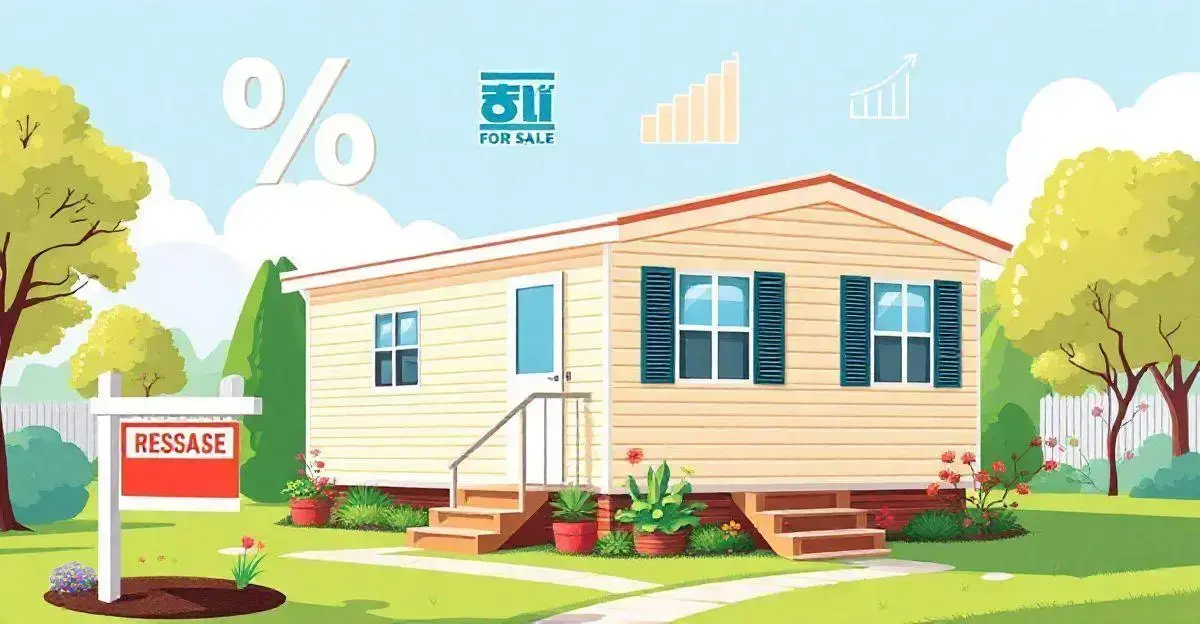Are mobile homes good investments? As the housing market continues to evolve, many are exploring alternative living options.
Understanding Mobile Homes
Understanding mobile homes is essential for anyone considering this living option. Mobile homes, also known as manufactured homes, are built in factories and then transported to their permanent locations.
They offer a unique blend of affordability and flexibility compared to traditional homes. Many people are drawn to mobile homes because of their lower cost and the ability to place them in various locations.
In terms of construction, mobile homes are subject to federal safety standards, ensuring they are built to be durable and safe. However, when choosing a mobile home, it’s crucial to consider factors like location, access to amenities, and local laws regarding mobile home parks.
Buying a mobile home can be an excellent choice for families, retirees, or those looking to downsize. They often come with modern features and energy-efficient options, making them appealing for those who want a smaller environmental footprint.
In summary, understanding the ins and outs of mobile homes will help you make a more informed investment decision.
The Investment Potential of Mobile Homes

The investment potential of mobile homes is an important topic for many looking to enter the real estate market. Unlike traditional homes, mobile homes usually have lower purchase prices, which can be appealing for new investors. They often require less maintenance and can yield substantial rental income if placed in a good location.
Investors should focus on the location and community surrounding the mobile home. Areas with growing populations or near urban centers typically offer the best opportunities. Additionally, mobile homes in established parks with amenities can attract higher rents.
Many mobile homes appreciate in value over time, especially if mounted on owned land. Investors need to be aware of regulations and zoning laws, which can affect land usage and property values.
Overall, mobile homes can be a smart investment choice if approached wisely, offering a unique way to enter the property market with lower upfront costs and potentially lucrative returns.
Comparing Mobile Homes to Traditional Homes
Comparison:
Affordability: Mobile homes typically cost less than traditional homes, making them more accessible.
Construction: Traditional homes are built on-site, while mobile homes are constructed in factories and transported to their locations.
Maintenance: Mobile homes may have different upkeep needs, while traditional homes might incur higher maintenance costs due to larger areas and systems.
Investment Value: Traditional homes often appreciate over time compared to mobile homes, unless placed on owned land.
Conclusion: Choosing between mobile and traditional homes depends on personal preference, budget, and investment goals.
Costs Associated with Mobile Homes

Cost Factors:
Purchase Price: generally lower than traditional homes.
Transportation Fees: for moving the home to your site.
Setup Costs: for connecting utilities.
Land Leasing Fees: if you don’t own the land.
Property Taxes: ongoing costs.
Insurance Costs: ongoing costs.
Maintenance Expenses: regular expenses that can add up over time.
Financing: can lead to higher interest rates or stringent loan terms.
Advice: When planning to invest, be sure to account for all these factors to understand the total cost of ownership fully.
Financing Options for Mobile Homes
Financing options for mobile homes are crucial to understand for potential buyers. Several avenues exist for securing funds. One common method is through traditional loans, which can be similar to those used for traditional homes, especially if the mobile home is on owned land.
Another option is chattel loans, specifically designed for mobile homes not attached to land. These loans often have shorter terms and higher interest rates due to the depreciation of the mobile home.
Buyers may also consider personal loans, which offer flexibility but can carry high-interest rates. It’s essential to shop around and compare different lenders to find the best rates.
Manufacturers may provide financing options as well, including promotional offers that can make purchasing more affordable. Additionally, some government programs exist to assist buyers in securing financing, especially for first-time homeowners.
Understanding these various financing avenues will help you make a more informed decision when considering a mobile home purchase.
Resale Value of Mobile Homes

The resale value of mobile homes can vary widely based on several factors. Generally, mobile homes do not appreciate in value like traditional homes, meaning they may lose value over time. However, homes that are kept in good condition and situated on owned land can hold their value better.
Location plays a significant role; mobile homes in desirable areas or near urban centers often have better resale opportunities. Upgrades and renovations can also improve resale value, making a mobile home more appealing to buyers. It’s essential to consider the community and the park rules because mobile home parks may restrict modifications.
Investors should also be aware of market conditions, as the resale value can fluctuate with demand for affordable housing. The overall economy and interest rates can impact potential buyers’ ability to purchase mobile homes, which in turn affects their resale value.
Mobile Home Communities: Pros and Cons
Mobile home communities can offer various benefits and drawbacks. One significant advantage is affordability. Living in a mobile home community often costs less than traditional housing, providing a budget-friendly option. Additionally, many communities come with shared amenities, such as pools, clubhouses, and recreational areas, allowing residents to enjoy social activities.
On the downside, some mobile home communities have rules and restrictions that can limit personal freedom. For instance, there may be regulations on home modifications or landscaping. Moreover, living close to neighbors can lead to issues with privacy or noise.
Another important factor is the stability of the community. Some mobile home parks may have high turnover rates, which can affect community spirit and safety. Buyers should consider these aspects carefully when choosing a community to live in.
Making an Informed Decision

Making an informed decision about purchasing a mobile home involves considering several crucial factors. First, evaluate your budget. Knowing how much you can afford will help narrow down your options.
Next, research different communities and assess their amenities. Look for community reviews to understand the living experience better.
Another important aspect is to inspect the mobile home itself. Check for signs of wear and damage to ensure you are making a sound investment.
Additionally, understand the financing options available to you, as they can significantly affect your monthly payments.
Lastly, don’t forget to look into local laws, as zoning regulations may impact your use of the property. By gathering all this information, you can make a confident and informed decision about buying a mobile home.
Weighing the Benefits and Challenges of Mobile Home Ownership
Investing in a mobile home can be a wise decision, given the right circumstances. With lower costs and various financing options, mobile homes can provide a feasible path to homeownership.
However, it is essential to weigh the pros and cons of mobile home living, from community rules to potential resale value.
By understanding all aspects of mobile home ownership, potential buyers can make informed choices that suit their lifestyle and financial goals.